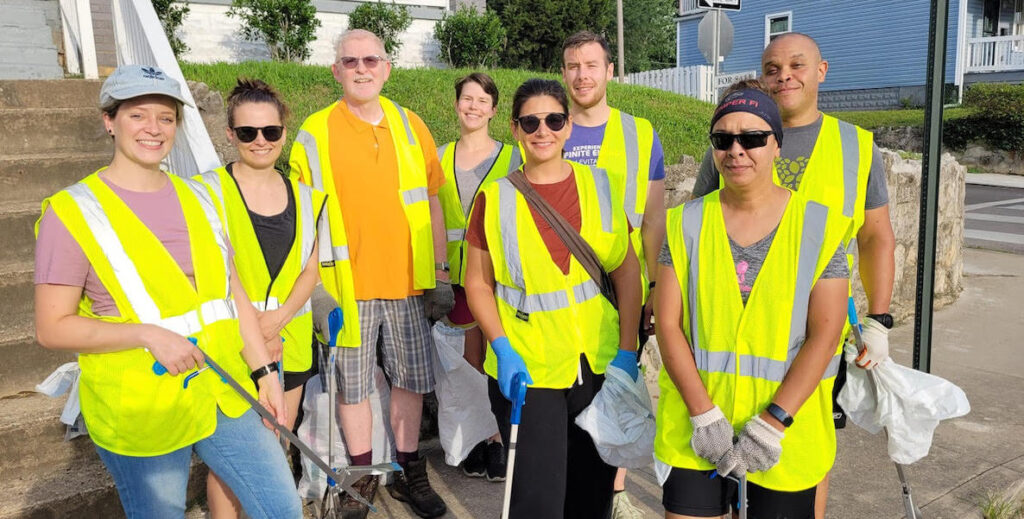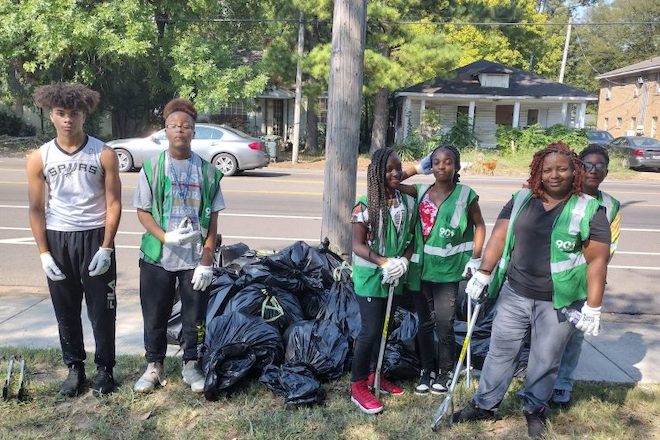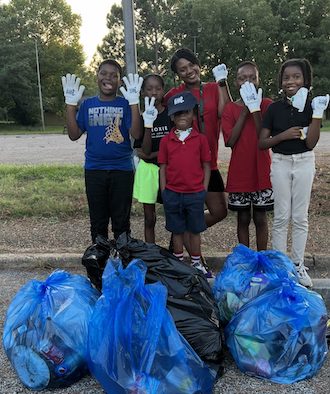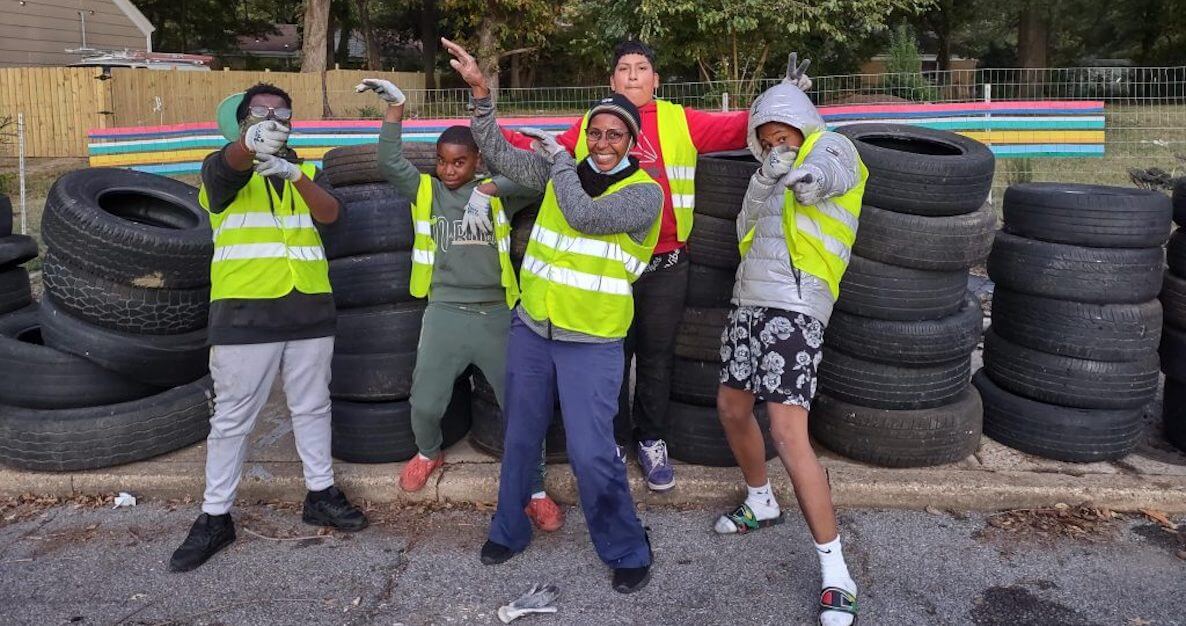Columbus, Ohio, like Memphis, Tennessee — and like Philadelphia — is a dirty city, with pounds of trash littering its parks, waterways and alleys. And for years, the pattern in Columbus was the same: Come springtime, resident volunteers would pull out their gloves and their bags and pick up the litter that had accumulated there all winter long. Then, as school ended and summer came around, that effort would drop off.
To Aryeh Alex, director of Keep Columbus Beautiful (KCB), this raised a conundrum: “It’s one thing to have everyone come out for a single day event, but how can we draw it out? What’s something that people will come out to often, that keeps them engaged and excited?”
The answer, in Columbus (as it could be in Philly): Baseball.

In 2019, KCB partnered with Columbus’s minor league baseball team, the Clippers, to offer prizes to the winning teams in a litter pick-up competition that ran from June through July. Dubbed “Columbus Litter League,” the aim was to — wait for it — “strike out” litter throughout the city by encouraging volunteer teams to pick up more trash than other teams, all vying for the grand prize: A wiffle ball game featuring the winners, their friends, and members of the Clippers on the team’s ball field.
Columbus’ Litter League … works to solve a short- and long-term litter problem — cleaning up today’s trash and convincing residents to just stop dropping their trash on the ground.
After a pandemic break, Columbus ran their second Litter League competition in 2022, with 31 teams doing 130 cleanups that added up to 69,000 volunteer hours. In all, participants picked up 77,130 pounds of litter. This year, Alex says KCB has already recruited five new teams, and expects to reach about 50 competitors in total.
Columbus’ Litter League, like similar programs held in New York City, Pittsburgh and Memphis, works to solve a short- and long-term litter problem — cleaning up today’s trash and convincing residents to just stop dropping their trash on the ground.
“Litter is one of the few things that is completely solvable,” Alex says. “It’s us as humans needing to change our behavior. Cleanups don’t do that. But they do educate people — you go on a cleanup and see the amount of litter out there, and then you tell people it’s a real problem. Or someone is getting ready to throw a piece of litter out of their car, sees someone cleaning up and thinks twice. Or they go to a Clippers game and see on the screen about people cleaning up litter.”
There’s a lot of trash out there
Like in Columbus, Litter Leagues around the country have been launched by the local branches of Keep America Beautiful (KAB), which, in a landmark 2020 study, found just how dirty America is. Among its findings: There are 152 pieces of litter for each U.S. resident; more than 2,000 pieces of litter per mile; and 6 billion pieces of litter more than four inches in size.
But we don’t need Keep America Beautiful to tell us about the pervasiveness of litter. We have the streets of Philadelphia. Using KAB metrics, the City’s Litter Index last spring found that Philly has around 10,000 blocks with “moderate to severe” litter condition. This includes illegal dumping sites, the trash-strewn on-ramps to city roads, the everyday Big Gulp cups shoved in sewer grates (and much, much more).
Like many issues, the pandemic made things worse. Trash pick-up delays meant more time for garbage cans to spill over and wind to whip around the contents of open recycling bins. Alex notes it also introduced paper face masks to our sidewalks, as well as many more food delivery containers. That has abated some, but in Philadelphia — which still does not have citywide street cleaning, despite Mayor Kenney promising and residents saying they want it — the mess is still a mess.
Ogbeiwi-Rusher says, “Sometimes people don’t even realize how much litter is out there until they start cleaning up. We’ve had some days when we’ve picked up 27 bags of trash. It’s shocking.”
Philadelphia these days does not have a branch of Keep America Beautiful. Keep PA Beautiful launched its own litter program last year called Pick Up Pennsylvania with the clever tagline “PA Fights Dirty” to encourage cleanups around the state. They provide free gloves, safety vests and trash bags to volunteers who register their spring or summer cleaning events with the organization, and help rally young people and other volunteers to pick up the trash.
That’s great — as Keep PA Beautiful says “Every Litter Bit Matters” — but it lacks both the competitive and sizzle aspects of Litter Leagues. The latter is what The Citizen and other media outlets in Philly, along with all the professional sports teams, attempted to capitalize on in 2020, when we launched an anti-litter campaign: “We Talk Trash. We Don’t Trash Philly.” That campaign was trashed by Covid, which is why you likely missed it.
Competition, meanwhile, is often the spark needed for behavior change. Look at, for example, voting: a 2018 turnout competition in New Jersey among small towns in Cumberland County led to an 18 percent increase in voting in the winning city (Shiloh). And like with voting, once people learn to pick up litter, they may just keep picking it up.

That’s why last year, the Ohio mayors of Columbus and Toledo (“Grand Slam Litter Out of Toledo”) upped the ante with a friendly wager to see which city could pick up the most trash in their Litter League competitions. When the much smaller Toledo was briefly ahead, Alex says, his city’s teams rallied to the occasion for a resounding win.
“We weren’t having it,” he says. “After that first month, our teams really stepped up their game.”
What’s even better than winning an actual baseball championship?
Memphis City Beautiful (MCB) launched their first Litter League last fall, with a slight difference: it’s a basketball town, so the Tennessee city partnered with its NBA team, the Grizzlies, for what it called “Slam Dunk Litter League.” For their contest, sponsors paid for prize money for the top three teams — $1,500, $1,000 and $500 — and all three got a chance to watch a Grizzlies game from the mayor’s box. (It was the games, not the cash, that motivated people, according to MCB Executive Director Eldra White.)
Each team registered with MCB, which sent them gloves and trash bags. The teams organized their own cleaning events, then uploaded photos of the bags they filled. The city then sent around a trash truck to collect the bags and verify the number. Each bag collected was worth 2 points; tires, up to five per cleanup, earned 1 point. (Columbus left tires and bulk out of the contest.) In total, over 244 cleanups resulted in 3,657 bags of trash and 1,277 tires collected on the streets of Memphis.
“It was interesting to see teams formed by people who were savvy with cleanups, and people who had never done cleanups before,” White says. “It was a great way to get people really engaged in this issue.”

The winning team in Memphis was from Klondike Smokey City Community Development Corporation (CDC), from one of the city’s mostly Black underserved neighborhoods. In addition to blight — abandoned homes and cars — Klondike Smoky City is divided by an expressway, where drivers toss trash out their windows, which inevitably makes its way to the parks and sidewalks of the neighborhood.
Eziza “Dr. Eziza” Ogbeiwi-Rusher, the CDC’s environmental coordinator, is in charge of cleaning and greening the area — an uphill battle that has been making some progress the last couple of years. “We are always working on getting people involved, saying to them this is their responsibility, that you should be keeping your neighborhoods clean,” Ogbeiwi-Rusher says. “Sometimes people don’t even realize how much litter is out there until they start cleaning up. We’ve had some days when we’ve picked up 27 bags of trash. It’s shocking.”
Her Litter League team consisted of nine people, who earned 1,500 points — close to 700 bags of trash — about 400 more than the second place, two-woman team, the Stiles Stuffers (1,100 points). They won three out of the four staggered competitions within the competition, earning a pizza night; tickets to the zoo and the Stax Museum; the cash prize, and Grizzlies tickets. For some members of the team, including Ogbeiwi-Rusher, it was their first time at a Grizzlies game.
That Litter League win spurred more creative thinking in Klondike Smokey City, and this year Ogbeiwi-Rusher says they are working on an intra-neighborhood contest among individual households, competing to see who can keep their sidewalks trash-free. The details are still being worked out, but the idea is the same as with the Litter League: The winner is not the team with the most trash bags out front. It’s all of us who benefit from a cleaner city. That — dare I say it? — may be even better than our Phillies cleaning up in the actual World Series.
![]() MORE SOLUTIONS TO THE TRASH CRISIS FROM THE CITIZEN
MORE SOLUTIONS TO THE TRASH CRISIS FROM THE CITIZEN



